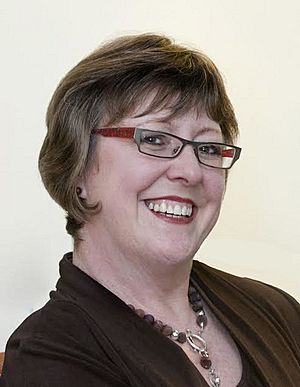Leeanne Carey facts for kids
Professor Leeanne Carey is a leading Australian neuroscientist. She is known for her work in occupational therapy and helping people recover from a stroke. She started and leads the Neurorehabilitation and Recovery research group at the Florey Institute of Neuroscience and Mental Health in Melbourne, Australia. She also holds a special fellowship from the Australian Research Council (ARC).
Contents
Early Life and Education
Leeanne Carey finished high school in Melbourne in 1977. She was the top student in her school and did very well in her English exam.
She then went to the Lincoln Institute of Health Sciences. In 1987, she earned a Bachelor's degree in Occupational Therapy. In 1993, she became the first person in Australia to complete a Doctor of Philosophy (PhD) in Occupational Therapy from La Trobe University. Her PhD research looked at how training could help people who lost their sense of touch and movement after a stroke.
Her Work and Research
Professor Carey has dedicated her career to helping people recover from stroke. She has worked in hospitals and universities, always focused on improving rehabilitation.
Early Career Steps
Before starting her PhD in 1990, Leeanne Carey worked as an occupational therapist at a hospital from 1981 to 1983. She also taught university students at the Lincoln Institute of Health Sciences. After the Lincoln Institute joined La Trobe University, she became a lecturer. In 1989, she became the Chief Occupational Therapist at another rehabilitation hospital.
Leading Stroke Recovery Research
After finishing her PhD, Professor Carey continued her important research. She earned several research fellowships, which are special grants that allow scientists to focus on their studies. In 2004, she started her own research lab called the Neurorehabilitation and Recovery Research group. This group helps people get better after a stroke. Her lab is now part of the Florey Institute of Neuroscience and Mental Health.
She also became a professor at La Trobe University and joined the Florey Institute. In 2013, she was chosen to be part of the Australian Academy of Science, which is a great honor for scientists.
By 2014, her research lab had grown to 24 researchers. This team includes experts in occupational therapy, physiotherapy, neurology, psychology, and neuroscience. They all work together to understand and improve stroke recovery.
What Her Research Focuses On
Professor Carey's research focuses on four main areas:
- Finding new ways to help people recover from stroke.
- Understanding how stroke affects a person's senses and movement.
- Using new brain scanning tools and special markers in the body to guide rehabilitation.
- Studying how depression and thinking problems affect stroke recovery.
Her research uses ideas about how the brain can change and learn new things, a process called neural plasticity. She uses tools like Magnetic Resonance Imaging (MRI) to see how the brain changes during recovery. This helps her team find the best ways to help stroke survivors. Recently, her work has also looked at how mood and thinking skills affect recovery.
Funding Her Discoveries
Throughout her career, Professor Carey has received over $8.8 million AUD in research funding. This money comes from special grants and helps her team do their important work.
Sharing Her Knowledge
Professor Carey has written over 75 scientific articles that have been reviewed by other experts. Her work has been cited by other scientists over 1200 times, showing how important her contributions are. In 2012, she was asked to edit a book called 'Stroke Rehabilitation: Insights from Neuroscience and Imaging'.
Personal Life
Leeanne Carey lives in Melbourne, Australia. She is married and has two children.
Awards and Honors
Professor Carey has received many awards and honors for her groundbreaking work:
- 2013: Nominated for the World Federation of Neurological Rehabilitation Franz Gerstenbrand Award.
- 2013: Nominated for the Victoria prize for science and innovation.
- 2013: Chaired the first Occupational Therapy Australia Research Foundation.
- 2013: International Visiting Professor at the University of Haifa, Israel.
- 2011: International Visiting Professor at Washington University School of Medicine, USA.
- 2010: Honored by the World Federation for Neurorehabilitation (WFNR).
- 2010: Finalist for the BrainLink Women of Achievement Award.
- 2009: Inducted into the Academy of Research of the American Occupational Therapy Foundation for her outstanding contributions to occupational therapy science.
- 2009: Awarded an Australian Research Council (ARC) Future Fellowship.
- 2004-2008: Received a Career Development Award from the National Health and Medical Research Council (NHMRC) of Australia.
- 1995: Awarded a Postdoctoral Research Fellowship from La Trobe University.
- 1994: Received a Research Grant from La Trobe University for post-doctoral studies.
- 1991: Won the Australian Association of Occupational Therapists Research Award.
- 1990: Received an Australian Postgraduate Research Award.
- 1988: Won the World Federation of Occupational Therapists Foundation Research Award (a worldwide award given every four years).
- 1988: Received a La Trobe University Postgraduate Scholarship.
- 1981: Received a special commendation for her grades in her final year of study at La Trobe University.
- 1977: Was the top student at Chavoin College, Melbourne, Australia, and received a Special Distinction in her English exam.


